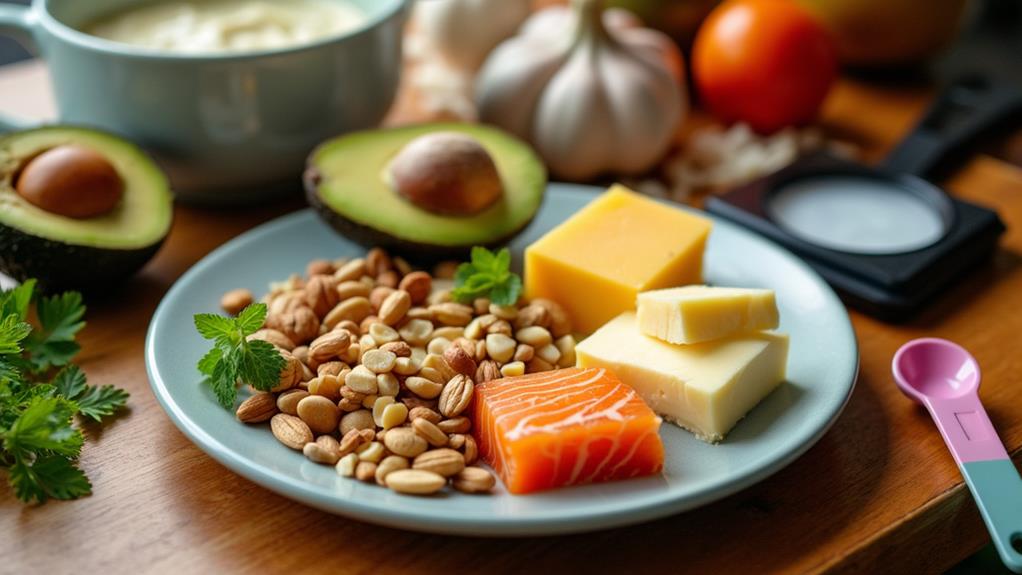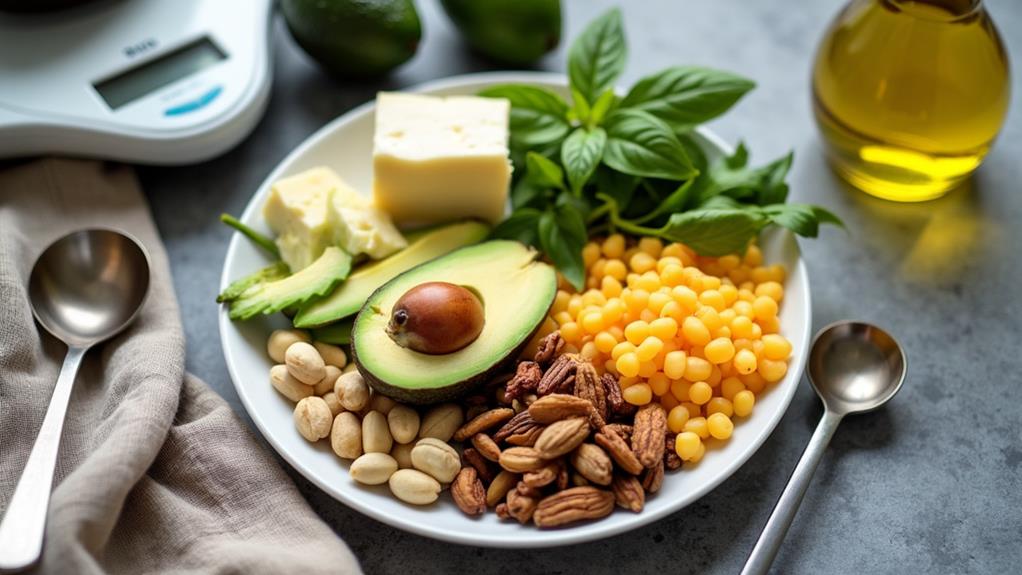
For individuals adhering to a ketogenic diet, fat should constitute 65-80% of daily caloric intake, equating to approximately 144-178 grams of fat per day on a 2,000 calorie regimen. This substantial fat intake induces a state of ketosis, where the body relies on fat rather than carbohydrates for energy. Key sources for healthy fats include avocados, nuts, seeds, and fatty fish. It is essential to monitor fat intake to maintain ketosis and guarantee a balanced nutrient profile. To better understand the nuances and benefits of managing fat consumption on keto, exploring this further will yield valuable insights.
Key Takeaways
- Fat should constitute 65-80% of daily calories on the keto diet.
- For a 2,000 calorie diet, this equates to approximately 144-178 grams of fat daily.
- Personalized fat intake may adjust to 1 gram of fat per pound of body weight.
- Monitoring blood ketone levels helps confirm the maintenance of ketosis.
- Healthy fat sources include avocados, nuts, seeds, and fatty fish.
Understanding the Keto Diet
To grasp the fundamentals of the ketogenic diet, it is essential to explore its core principles and nutritional foundations. Central to the keto principles is the significant reduction of carbohydrate intake, typically to about 5-10% of total daily calories. This dietary shift prompts the body to enter a state of ketosis, wherein fat becomes the primary fuel source.
Food tracking is vital to maintain proper macronutrient ratios, ensuring you stay within the carb limits. To achieve and maintain ketosis, dietary flexibility is somewhat limited, with fat intake constituting approximately 70-80% of daily caloric intake.
For individuals adhering to a standard 2,000 calorie diet, this translates to ingesting around 144 to 178 grams of fat per day. This guideline aligns with the recommendation of consuming about 1 gram of fat per pound of body weight.
Concurrently, protein intake should be moderate, comprising 20-25% of daily calories, while carbohydrate intake remains minimal.
Monitoring fat consumption is vital; insufficient fat can impede the metabolic shift to ketosis, while excessive fat intake may decelerate weight loss. Hence, understanding and adhering to these macronutrient ratios is essential for optimizing the ketogenic diet's effectiveness and ensuring nutritional adequacy.
These keto principles serve as a foundational guide for successfully implementing and sustaining a ketogenic lifestyle.
Role of Fat in Keto
Healthy fat consumption plays a vital role in the ketogenic diet, fundamentally driving the process of ketosis. On a ketogenic diet, approximately 65-80% of daily caloric intake should come from fats, translating to about 144 to 178 grams of fat on a 2,000-calorie diet. This high fat intake is essential for inducing and maintaining ketosis, a metabolic state where the body shifts from relying on carbohydrates to fat metabolism for energy production.
Including monounsaturated fats, such as those found in olive oil, can improve heart health while supporting ketosis.
Fat metabolism is significant in this diet because it results in the production of ketones, which serve as an alternative fuel source for the brain and body. Beyond energy production, healthy fats are indispensable for hormone production, brain function, and the absorption of fat-soluble vitamins (A, D, E, K).
Consuming a variety of healthy fats—such as those found in avocados, nuts, seeds, and fatty fish—ensures the intake of essential fatty acids and nutrients, thus supporting overall health.
Insufficient fat intake can hinder ketosis, leading to increased hunger and difficulties in weight management. As a result, adequate consumption of healthy fats is vital for the successful implementation and sustainability of a ketogenic diet, ensuring both metabolic efficacy and nutritional balance.
Daily Fat Intake Guidelines
Understanding the role of fat in a ketogenic diet sets the foundation for determining appropriate daily fat intake guidelines. On a ketogenic diet, fat intake should constitute approximately 65-80% of total daily calories to effectively induce and maintain ketosis. For a standard 2,000 calorie diet, this translates to around 144 to 178 grams of fat per day.
This substantial intake is necessary to shift the body's primary energy source from carbohydrates to fats, promoting the production of ketones. It's important to note that monitoring blood ketone levels is essential to confirm the state of ketosis and optimize fat burning.
Tailoring fat intake can also be personalized, with some individuals adjusting their consumption to about 1 gram of fat per pound of body weight. This adjustment is contingent upon personal goals and activity levels, which may require more precise daily tracking. Consistently monitoring fat intake is vital to guarantee adherence to the macronutrient ratios typical of a ketogenic diet.
Moreover, carbohydrate intake should be kept below 5-10%, typically around 20-50 grams per day, to support ketosis. Regular monitoring of fat intake can help prevent excessive consumption that may hinder weight loss or lead to unwanted health effects.
This precision in daily tracking guarantees the diet is effective and sustainable over the long term.
Calculating Your Fat Needs
Determining your specific fat needs on a ketogenic diet requires careful calculation and consideration of various personal factors. Central to achieving and maintaining ketosis, your fat intake calculation should reflect your unique physiological and lifestyle characteristics.
To start, fat should comprise approximately 65-80% of your total daily caloric intake. For example, on a 2,000 calorie diet, this equates to about 144 to 178 grams of fat per day. Remember to distribute your protein intake evenly across meals to maintain optimal muscle synthesis and ketosis.
Several key factors influence your personalized fat requirements:
- Body Weight: A common guideline is to consume about 1 gram of fat per pound of body weight.
- Activity Level: More active individuals may require higher fat intake to meet their energy needs.
- Weight Loss Goals: Specific objectives, such as accelerated weight loss, may necessitate adjustments in fat consumption.
Tracking your daily fat intake is essential for ensuring adherence to these macronutrient ratios and achieving desired outcomes.
High-Fat Food Options
To effectively meet the calculated fat requirements on a ketogenic diet, incorporating a variety of high-fat food options is imperative. Fatty fish like salmon are excellent choices, providing around 7 grams of omega-3 rich fat per ounce. Avocados, renowned for their heart-healthy monounsaturated fats, offer approximately 15 grams of fat per medium-sized fruit, making them a versatile addition to many dishes.
Nut varieties such as almonds contribute about 16 grams of fat per ounce, alongside fiber and protein, making them ideal high-fat snacks. Coconut oil, rich in medium-chain triglycerides (MCTs), delivers around 14 grams of fat per tablespoon and can be seamlessly integrated into various recipe ideas. For those seeking dairy options, full-fat cheeses and heavy cream are excellent sources of dietary fats.
Effective meal planning and oil selections, such as olive and avocado oils, can further enhance fat intake. Here is a table showcasing high-fat food options:
| Food Item | Fat Content (grams) |
|---|---|
| Salmon (per oz) | 7 |
| Avocado (medium) | 15 |
| Almonds (per oz) | 16 |
| Coconut Oil (tbsp) | 14 |
| Cheese (per oz) | 9 |
When eating out, opt for dishes rich in these high-fat components to stay aligned with your dietary goals.
Healthy vs. Unhealthy Fats
Maneuvering the landscape of dietary fats on a ketogenic diet involves distinguishing between healthy and unhealthy fats to optimize both health and nutritional efficacy.
Beneficial fats, such as monounsaturated and polyunsaturated fats, should be prioritized. These fats, found in avocados, nuts, and olive oil, are essential for heart health. Omega-3 fatty acids, particularly from fatty fish like salmon, are also highly recommended due to their positive impact on brain and heart health. Incorporating oils with high smoke points, like avocado oil, allows for versatile cooking methods without compromising nutritional value.
Conversely, harmful fats, such as trans fats, should be strictly avoided. Often present in processed and fried foods, trans fats are linked to an increased risk of heart disease.
Saturated fats, while permissible in moderation on a keto diet, should be consumed with caution. Excessive intake of saturated fats can raise LDL cholesterol levels, potentially heightening cardiovascular risks.
To hook the audience, consider the following:
- Prioritize beneficial fats: Incorporate avocados, nuts, and olive oil.
- Limit harmful fats: Avoid trans fats found in processed foods.
- Balance nutrient intake: Include omega-3 fatty acids from sources like salmon.
Incorporating a variety of healthy fats not only supports hormone production but also enhances the absorption of fat-soluble vitamins (A, D, E, K), vital for overall well-being on a ketogenic diet.
Benefits of High Fat Intake

Understanding the distinction between healthy and unhealthy fats lays the foundation for reaping the benefits of a high-fat ketogenic diet. A ketogenic diet typically mandates that fats constitute 60-80% of daily caloric intake, equating to approximately 133 to 178 grams of fat for a 2,000 calorie diet. This high fat intake is essential for achieving fat adaptation, where the body efficiently utilizes fat as its primary energy source.
This shift in energy balance supports sustained energy levels, mitigating hunger and cravings. Additionally, the keto diet can help improve insulin sensitivity, which is beneficial for managing diabetes.
Healthy fats are vital for the absorption of fat-soluble vitamins (A, D, E, K), which are essential for various physiological functions. Additionally, research suggests that increasing the intake of healthy fats, particularly from unsaturated sources, can improve cholesterol profiles and promote cardiovascular health. Sources of such beneficial fats include avocados, nuts, and fatty fish, which are fundamental to the diet.
Moreover, the brain, composed of approximately 60% fat, relies on dietary fats for ideal cognitive function. Incorporating these healthy fats can enhance brain performance, offering a thorough array of benefits that extend beyond mere energy provision.
Common Mistakes to Avoid
Maneuvering a ketogenic diet successfully requires attention to detail and awareness of common pitfalls. One frequent mistake is overconsumption of protein, which can hinder ketosis. Protein should only constitute 20-25% of your total daily calories, while the majority should come from fats.
It's also essential to manage carbohydrate intake, as hidden carbs often lurk in sauces, dressings, and processed foods, making it imperative to read labels and track your intake meticulously.
Failing to prioritize electrolyte intake can also lead to discomfort during the adaptation phase. Supplementing with salt or using broth can help maintain electrolyte balance.
Additionally, neglecting meal prep and tracking food intake can result in imbalances in your macronutrients, making it difficult to achieve the recommended fat intake of 65%+ of daily calories. This can be especially challenging when dining out, where hidden carbs and inappropriate macronutrient ratios are common.
- Overconsumption of protein: Aim for protein to make up only 20-25% of your total daily calories.
- Hidden carbs: Always read labels and track your intake diligently.
- Lack of electrolyte intake: Consider supplementing with salt or using broth.
Adapting to High Fat Intake

Adapting to a high-fat intake on a ketogenic diet involves an initial adjustment phase where individuals may encounter symptoms such as fatigue and cravings.
Guaranteeing adequate intake of essential supplements, such as magnesium and omega-3 fatty acids, can help mitigate these symptoms.
Selecting healthy fat sources like avocados, nuts, and olive oil is imperative for meeting daily fat targets and promoting ideal health.
Regular monitoring of macronutrient intake can guarantee balanced nutrition and facilitate a smoother shift to ketosis.
Initial Adjustment Phase
During the initial adjustment phase of the ketogenic diet, individuals need to recalibrate their macronutrient intake, with approximately 70-80% of their daily calories coming from fat. For a standard 2,000 calorie diet, this translates to around 144-178 grams of fat daily.
This phase, lasting about 3-5 weeks, is essential for the body to adapt from using carbohydrates to fats as the primary energy source. However, this shift is often accompanied by temporary side effects known as "keto flu," characterized by symptoms like headache, fatigue, and irritability.
To manage these symptoms and support the body's adaptation:
- Gradually increase fat intake: Prevent gastrointestinal discomfort by slowly ramping up fat consumption, allowing the digestive system to adjust.
- Maintain electrolyte balance: Incorporating bone broth or adding salt to meals can help alleviate keto flu symptoms and support overall electrolyte levels.
- Track fat intake: Use food journals or apps to monitor fat consumption, ensuring adherence to dietary goals and facilitating a smoother shift.
Fat Sources Selection
Selecting the right fat sources is essential for success on a ketogenic diet, ensuring not only adherence to macronutrient goals but also promoting overall health. A well-rounded approach to fat source variety enhances nutrient density and supports long-term adherence.
Healthy fat sources include avocados, nuts, seeds, fatty fish like salmon, and oils such as olive oil and coconut oil, which provide essential fatty acids and important nutrients.
Incorporating unsaturated fats from plant sources is particularly beneficial. These fats support heart health and should be prioritized over saturated fats, which should be consumed in moderation.
High-fat snacks like cheese, nut butters, or olives not only help meet daily fat intake goals but also offer satiety and essential nutrients, making them an excellent addition to a ketogenic diet.
Conversely, it is important to avoid trans fats commonly found in processed foods, as they can increase the risk of heart disease and negatively impact overall health.
Monitoring Macros Regularly
Maintaining a ketogenic diet necessitates meticulous monitoring of macronutrient intake to confirm the proper balance of fats, proteins, and carbohydrates. On a ketogenic diet, fats should constitute approximately 65-80% of total daily caloric intake, translating to about 133 to 178 grams for a standard 2,000 calorie diet. This high level of fat consumption is vital for sustaining ketosis and maintaining energy levels.
- Macronutrient tracking: Utilizing apps or food diaries to log daily food intake can help identify hidden carbohydrates and confirm adherence to ketogenic ratios.
- Dietary adjustments: Adjusting fat intake may be necessary if symptoms like fatigue or stalled weight loss occur, indicating the need for careful monitoring.
- Daily fat goals: Consuming around 1 gram of fat per pound of body weight can maintain ketosis, which supports energy levels and weight loss goals.
Regularly tracking macronutrients, including fats, proteins, and carbohydrates, is essential to avoid exceeding carbohydrate limits and to stay within desired ketogenic parameters.
Monitoring Your Progress
Effectively monitoring your progress on a ketogenic diet necessitates a thorough approach to guarantee you are meeting the necessary macronutrient ratios, particularly your fat intake. Progress tracking is essential to confirm you are consuming at least 65% of your daily calories from fat, which equates to approximately 144 grams on a 2,000 calorie diet.
Utilizing nutrition tracking apps can facilitate logging your daily fat intake, thereby assuring adherence to the recommended macronutrient ratios critical for maintaining ketosis. Regular reassessment of your macro needs is also important due to changes in activity levels or goals.
Regularly reviewing your food diary can help identify hidden carbs or excess protein that might impede ketosis. Additionally, tracking your weight loss, energy levels, and overall well-being can provide valuable insights into how your body is adapting to the high-fat diet.
Such meticulous monitoring allows for timely dietary adjustments, optimizing your keto journey.
Considering factors like age, activity level, and metabolic rate is significant as these can influence the effectiveness of the diet. Consequently, a personalized approach to progress tracking is recommended.
Adjusting Fat Intake

Adjusting fat intake on a ketogenic diet is a nuanced process that requires careful consideration of individual dietary needs and goals. Achieving ideal fat adaptation and enhancing metabolic flexibility are key components in maintaining ketosis and achieving desired health outcomes.
Typically, fat intake should constitute 60-80% of total daily calories, translating to 144 to 178 grams for a 2,000-calorie diet. However, individual adjustments are often necessary based on activity level, weight loss goals, and metabolic response. Regularly monitoring ketone levels with blood, urine, or breath meters can help guarantee that your dietary adjustments are keeping you in ketosis.
Regular monitoring and adjustments of fat intake can be beneficial, especially if one experiences symptoms such as fatigue or a weight loss plateau.
Here are key considerations for adjusting fat intake:
- Activity Level: More active individuals may require higher fat intake to support increased energy demands and maintain ketosis.
- Metabolic Response: Tracking fat intake through apps or food diaries helps identify how your body responds, allowing for fine-tuning to enhance fat adaptation.
- Weight Loss Goals: Adjusting fat consumption based on weight loss progress can help overcome plateaus and sustain long-term success.
Potential Health Risks
Adopting a ketogenic diet comes with potential health risks that must be carefully considered and managed. One significant concern is the development of kidney stones, which may result from increased uric acid levels due to high fat intake and dehydration. To mitigate this risk, it is essential to maintain adequate hydration and monitor uric acid levels.
Nutrient deficiencies are another potential issue, as the restrictive nature of the diet can limit the variety of foods consumed, particularly those rich in essential vitamins and minerals. Ensuring a well-rounded intake of micronutrients through careful meal planning or supplementation is vital.
Cardiovascular risks may arise from excessive consumption of saturated fats, a common component of high-fat diets. Elevated cholesterol levels could result, necessitating a balance with healthier fat sources such as avocados, nuts, and olive oil.
Gastrointestinal issues, such as constipation, can occur if the diet lacks sufficient fiber, often due to the restriction of many fruits and grains. Including fiber-rich, low-carbohydrate vegetables can help alleviate these symptoms.
Individuals with pre-existing conditions, especially liver or kidney diseases, may face heightened health risks on a ketogenic diet. It is imperative for such individuals to consult healthcare professionals before making dietary changes.
Consulting a Professional

Given the potential health risks associated with the ketogenic diet, seeking advice from a healthcare professional becomes a wise step.
Professional guidance is vital for tailoring fat intake recommendations to align with individual health conditions and dietary needs. Registered dietitians can personalize the ideal daily fat intake, typically ranging from 65% to 80% of total calories, to effectively maintain ketosis.
- Dietary Assessment: A thorough dietary assessment can identify potential nutrient deficiencies and suggest necessary supplements, ensuring a balanced intake of vitamins and minerals while following a high-fat diet.
- Monitoring Blood Lipid Levels: Regular consultations with healthcare providers can monitor blood lipid levels, identifying adverse effects of high fat intake on cardiovascular health, such as increased cholesterol levels.
- Managing Pre-existing Conditions: Professional advice is fundamental for individuals with pre-existing medical conditions, like diabetes or kidney disease, which might complicate adherence to a ketogenic diet.
Frequently Asked Questions
Is 100 Grams of Fat Too Much on Keto?
Consuming 100 grams of fat daily on a ketogenic diet can be appropriate, as long as it aligns with individual caloric needs and macronutrient ratios. Proper fat intake supports keto benefits, provided carbohydrate intake remains sufficiently low.
What Happens if I Don't Eat Enough Fat on Keto?
Inadequate fat intake on a ketogenic diet can lead to fat deficiency symptoms, including increased hunger, nutrient deficiencies, and decreased keto energy levels, hindering the body's ability to maintain ketosis and compromising overall health and diet efficacy.
Is 40 Grams of Fat a Day Too Much?
Forty grams of fat per day is markedly below keto guidelines. Adequate fat intake, typically over 65% of total daily calories, is essential for maintaining ketosis and ensuring satiety, according to established nutritional expertise on ketogenic diets.
What Are the Best Fats to Eat on Keto?
The best fats to eat on keto include avocados, fatty fish like salmon, nuts, seeds, and cooking oils such as olive oil, which are rich in healthy fat sources like monounsaturated and omega-3 fatty acids, promoting heart health.
Conclusion
The ketogenic diet necessitates a precise balance of macronutrients, with fat playing a pivotal role. Daily fat intake should align with individual energy requirements and dietary goals, typically constituting 70-80% of total caloric intake. Accurate calculation and ongoing monitoring of fat consumption are essential to maintain ketosis and achieve desired health outcomes. Consultation with a healthcare professional is recommended to tailor the diet appropriately and mitigate potential health risks associated with high-fat consumption.










No Comments